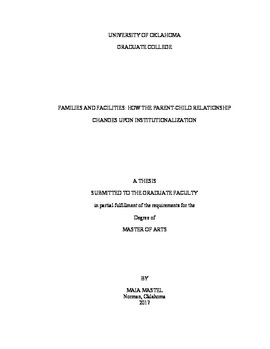| dc.contributor.advisor | Jervis, Lori | |
| dc.contributor.author | Mastel, Maia | |
| dc.date.accessioned | 2017-12-15T21:34:47Z | |
| dc.date.available | 2017-12-15T21:34:47Z | |
| dc.date.issued | 2017 | |
| dc.identifier.uri | https://hdl.handle.net/11244/52945 | |
| dc.description.abstract | This thesis endeavors to trace how the relationships and of the mainstream American family unit, specifically between adult children and their parents, are altered by the process of age-related institutionalization in a nursing home. The family unit is both a basic building block of society and a vehicle of cultural transmission. Families act out wider cultural trends in small-scale interactions, allowing observers a close-up, highly detailed view of societal norms. If enough families successfully deviate from those trends, they can even change a culture’s norms, mores, and traditions. Thus studies of the family remain well within the purview of the anthropologist. | en_US |
| dc.language | en_US | en_US |
| dc.subject | ageing | en_US |
| dc.subject | nursing homes | en_US |
| dc.subject | family relationships | en_US |
| dc.title | Families and Facilities: How the Parent-Child Relationship Changes Upon Institutionalization | en_US |
| dc.contributor.committeeMember | Marshall, Kimberly | |
| dc.contributor.committeeMember | Spicer, Paul | |
| dc.date.manuscript | 2017-12-15 | |
| dc.thesis.degree | Master of Arts | en_US |
| ou.group | College of Arts and Sciences::Department of Anthropology | en_US |
